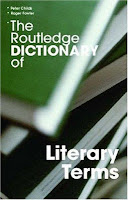"Whether applied to part of a work, or to the whole, implies that it is made up largely of phrases, motifs, images, episodes, etc. borrowed more or less unchanged from the work(s) of other author(s). The term is often used in a loosely derogatory way to describe the kind of helpless borrowing that makes an immature or unoriginal work read like a mosaic of quotations. More precisely, it has two main meanings, corresponding to two different deliberate uses of pastiche as a technique.
There is a kind of pastiche which seeks to recreate in a more extreme and accessible form the manner of major writers. It tends to eliminate tensions, to produce a more highly coloured and polished effect, picking out and reiterating favourite stylistic mannerisms, and welding them into a new whole which has a superficial coherence and order. Unlike plagiarism, pastiche of this kind is not intended to deceive: it is literature frankly inspired by literature frankly inspired by literature (as in Akenside's poem 'The pleasures of imagination', 1744).
The second main use of pastiche is not reverential or appreciative, but disrespectful and sometimes deflationary. Instead of ironing out ambiguities in its source(s) it highlights them. It cannot be distinguished absolutely from parody, but whereas the parodists need only allude to the original intermittently, the writer of pastiche industriously recreates it, often concocting a medley of borrowed styles [...]. A closely synonymous term, nearly obsolete, 'cento' or 'centoism', is relevant here: in its original Latin form it meant a garment of patchwork and, applied to literature, a poem made up by joining scraps from various authors. Many of the specialized uses of pastiche are reminiscent of this literary game: it may give encyclopaedic scope to a work, including all the previous styles (Joyce's Ulysses); it is used by writers who wish to exemplify their ironic sense that language comes to the secondhand and stylized (George Herbert's 'Jordan I'). And a general air of pastiche is created by many writers who, for various reasons, refuse to evolve a style of their own, and who [...] employ other's cast-off phrases with conscious scepticism.
Frederic Jameson argues that parody has been replaced by pastiche in postmodernism, where all the cultural styles of the past are open to cannibalization and appropriation: 'Pastiche is, like parody, the imitation of a peculiar or unique, idiosyncratic style, the wearing of a linguistic mask, speech in a dead language. But is a neutral practice of such mimicry, without any of the satiric impulse, devoid of laughter'."
Childs, Peter; Fowler, Roger (2006): The Routledge dictionary of literary terms. (p 167-168)
Taylor & Francis. London.


No comments:
Post a Comment